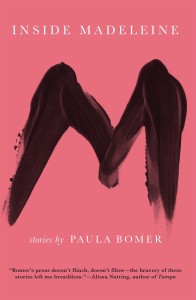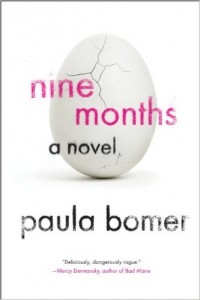Emily Gould: What surprised you, if anything, about reaction to Nine Months?
Paula Bomer: Well, I wasn’t surprised to get that one-star review that was like “this is disgusting!” A friend of mine checked out all the other books that person read and they were all, like, bodice-rippers. So that’s just not my audience, and I’m fine with that person thinking it’s disgusting. And I got a lot of “the narrator’s not sympathetic,” which I’m not surprised by, because it took me ten years to sell this book, and it was mostly because all these agents and editors didn’t find the character sympathetic enough. But finally I found an editor who loved her, and since then I’ve met a lot of people who’ve loved the book. And that’s been very gratifying. Even though I love to push buttons, I also love that some people get what I’m trying to do, and have sympathy for a character who has kind of lost her mind.
The funniest review, though, was a four-star review that said “This is an example, that some people should not have children! The narrator is a horrible person and it’s so great that someone wrote a book about how some people should not have children!”
EG: I asked a friend who is a literary agent why she thought this great book wasn’t published by a bigger publisher and why it is not, so far, a mainstream bestseller. And she said, that it’s because (spoiler alert) the narrator, Sonia, is redeemed at the end. She does these crazy things and there aren’t tragic consequences. In the mainstream bestseller version of this book, that narrator would have to be punished in some way.
PB: She’s unlikable, she doesn’t get punished …
EG: I don’t even think she’s “unlikeable!” It’s so weird that “likeability” has become so important to readers, somehow?! I can’t help thinking that when we’re talking about “likability” we’re talking about something else.
PB: Where are all these mythical perfect people, in life? And that’s who you want to read about? Reading books where the character isn’t particularly likable, where you can’t believe the character is doing whatever it is they’re doing – that’s a feeling that I had when I was reading Freedom, a lot. Richard Yates is another writer who writes characters who are incredibly human, in the “flawed” sense. Yet he writes beautifully about them, and with compassion. And that’s what I was, obviously, trying to do. Maybe pushing it, testing the limits of the empathy of the reader. And also, my book is clearly a satire – hence all the parts that are funny and over the top.
EG: The beginning of this book is a scene of childbirth that is so visceral, and it’s unprecedented in my reading experience to read a childbirth scene that … real. Is that what childbirth is really like?
PB: That’s a pretty easy birth! No complications, no C-section, no epidural, no episiotomy…
EG: I think not easy psychologically, though, for Sonia? The reader is so close to her character, and stays really close to her throughout the book. And maybe that’s why it’s such a distressing read for some people, it’s like you are so WITH her, you have so little distance from Sonia that you feel implicated in her decisions, so you have these feelings of guilt by association.
PB: The book was originally written from multiple points of view. And my editor said, you have to just write it from Sonia’s point of view, it’s her story. When you’re in her head, that’s where the book is. So I had to revise the entire novel, cut out all these parts, so that you’re with her the whole way.
EG: I can’t imagine the book any other way, at all.
PB: But that’s what novel-writing is, revising. Especially for me, for this novel. It really was a collaboration with my editor.
EG: You’re working on another book with the same editor now, right?
PB: Yes, a collection of stories plus a novella, and it’s very different – there’s not a single mother in it. It’s all these disturbing coming of age stories. Such a cliché, “coming of age,” but the characters range from age 12 to 22 and terrible things happen.
EG: That sounds great. I always like coming of age. At any age.
PB: Exactly, I mean, everyone is coming of age at all times. Even Sonia – coming to terms with who she is, coming to terms with being the mother of a third child, trying to integrate her identity as an artist – that can be considered coming of age, too. It’s kind of a silly term.
EG: To me this book felt unprecedented, but I did wonder if there was anything that influenced or inspired the writing decisions you made with Nine Months.
PB: There were a few nonfiction books that were very honest about motherhood: The Blue Jay’s Dance, by Louise Erdrich, about early motherhood, and she gets really intense talking about the dark side of it, and the hardship, and also the incredible love. And Anne Lamott wrote a book called Operating Instructions, and actually most recently I read an English writer called Elizabeth Jane Howard, and there are actually four books called The Cazalet Chronicles. There’s an amazing graphic birth scene in that. Very lengthy and explaining the culture around the birth of her child, and how they did it in England in the 1930s which was horrific –lying to her, drugging her.
Sometimes when I’m writing I don’t know what I’m doing til I’m halfway there. Nine Months takes place in the present tense. I don’t think I’ll be doing that again anytime soon. Generally, one must write in the past tense, I think. But I think the third person, present tense makes it seem more like first person … I think it helps with what I was trying to do with the pacing and the immediacy, and having the reader be on the journey with Sonia.
But the biggest influence on Nine Months was Philip Roth, specifically the character Nathan Zuckerman in the Zuckerman books. He has his character just do the craziest things – he’s on drugs, he’s on an airplane pretending to be a pornographer – there’s a wildness, yet the subject matter was serious. I was obsessed with those books. I kept going back to them. And there’s a character in Nine Months, Philbert Rush, which is my fake relationship with Philip Roth.
EG: I can’t believe that didn’t occur to me.
PB: I don’t think it’s obvious! But that’s what I was doing at the time. And I think it’s a very Roth thing to do, he has all these characters, like, he has a fake relationship with someone he thinks is Anne Frank. So I think it was appropriate for me to use him in that way.
EG: Are you familiar with Elisa Albert’s work at all, specifically her short story about HER imaginary relationship with Philip Roth? It’s in a collection called How This Night Is Different. She also has a thing for the “unlikeable” female protagonist. I think you’d really like her work.
PB: I wrote that down. I’m going to look her up after we get off the phone!
EG: What do people usually ask you about this book?
PB: A lot of people ask me how autobiographical the book is – how many children I have. I did an interview with Ed Champion and he asked whether I was thinking of having a third child when I wrote this book, and actually I was! My younger son was maybe three, and I was thinking, “Do I have another kid? This would be the time to do it.” And he was like, “You had to write a NOVEL to talk yourself out of having a third child?” I was like “I’d never thought of it that way.” But when writing, there is something of me in it, especially at the time – if I look back on what I was writing twenty years ago, it feels like a different person wrote it. A book kind of encapsulates a time in your life, and humans change constantly.
Actually, someone asked me for a sequel to Nine Months! And that’s something I’m so interested in doing. When I finish the book I’m working on right now, maybe I’ll embark on a sequel. And Sonia’s going to have three terrible teenagers. And it’ll be interesting to try to write about that – that’s the stage I’m in now, and it’s equally terrible, in a very different way! And wonderful.
EG: Maybe she’s taking the surly teenagers on a road trip to Philbert Rush’s funeral.
PB: I loved having her on a road trip, so that’s a great idea. Wouldn’t that be fun? So we’ll see about that. I have a lot of ideas. I have a whole idea folder.
But as far as the autobiographical element goes, sometimes Sonia is my mouthpiece. And at other points she’s completely not. In that whole section where she’s with Philbert Rush – and I think that’s the chapter that most encapsulates what I’m trying to do – she says, “Not having children is like not passing puberty. Not having children is like not graduating high school” and tells him that it’s life’s most important transformation. Recently, a childfree interviewer was sort of upset by that. And I told her, I have a lot of childfree friends who have very beautiful fulfilling lives, and I don’t agree with Sonia that it’s necessary to have children. For me personally it was important.
EG: Aren’t you kind of 80% of the way there with her, though? I mean, I totally respect people’s decision to be childfree – in many ways it is a more socially responsible decision. But it’s also a decision to miss out on one of the most interesting, challenging, amazing things that is possible to do as a human … that might be a bad reason to have children, come to think of it.
PB: I made having children a huge priority. I was living in Brooklyn, I was 27, I was friends with photographers and painters, none of whom were having children that early. And I lost a lot of friends. They were like “Why are you having a kid? You’re 27!” I was just that person who had wanted kids forever, like, babysitting five nights a week as a 12 year old. But I can’t speak for other people. There are a few parts of Nine Months where she mentions childfree artists – she talks about Aimee Mann, Joyce Carol Oates, Philip Roth. A lot of people just want to focus on their work, art, whatever. And I respect that, the choice of that. For me, personally, I wanted to experience the transition from being a child to being a parent. But that was really important to me.
EG: I do think there is a risk of getting trapped in the same relationship with your parents that you had as a child. This might be overly optimistic, but one of my hopes is that if I have a child I’ll be able to empathize with my parents in a new way.
PB: That was a life-changing thing, with my mother. I was an incredibly rebellious teenager, I was kind of the odd person out in the family. And the minute my first son was born, my relationship with my mother completely changed. I feel very grateful for that. It was the first time we had something in common. And she happened to be the world’s greatest grandmother. And now, just having my sons in my life – so, my oldest son will be leaving me in a year and a half, that’s all I have left with him! That empty nest syndrome, midlife crisis thing, that’s where I’m headed. I’m already in it. I feel so grateful for the time that I had him, even though a lot of it was really hard.
EG: Well, you have the rest of your life with him, now, to have a totally new kind of relationship, too.
PB: Yeah, where I never get to see him!
EG: Our November pick author, Barbara Browning, lives next door to her college-age son.
PB: Oh no. No no no, that’s not for me. I actually said, if you want to go to school in New York, I’m not paying for it. You need to spread your wings, you need to see the world. New Yorkers become terribly myopic. I’m from Indiana, I went to school in Boston, I lived in Spain for a year. I don’t want my kids to be like “I live in New York, I only know this neighborhood!” I’m hoping for him to go to school in the Midwest.
A friend of mine explained to me that having children is like building a boat in your basement. If you build a boat in your basement, and it’s still there? You’ve failed. But if you build a boat and it’s out on the water, doing its thing, then you did the right thing. As far as your boat-building goes.
EG: So your kids are now old enough that they are able to understand your work. Do they read it?
PB: No. There’s a few chapters they have read, and my older son, when I was revising, helped me by reading a chapter out loud for me. But not the whole book. Same goes for my husband – I’ve written two books, and he hasn’t read either of them. He’s heard me read parts, he comes to readings, but I mostly read … not the racy scenes. My next book is incredibly graphic and depressing and part of it, the novella, has just been published in The Literary Review. When copies came I was very excited, but I held it up in front of my children and I said “Never read this novella. Even after I die. Don’t read this.” They were like “Mom, don’t worry.” And at some point it’s out of my control, if they decide they want to sit down and read it. But they don’t really want to know.
Someone once asked me to consider how my writing would affect my children – what would my children think. If I was worrying about that – the kind of work that I want to do, I wouldn’t be doing it. I’d be a dishonest writer.
But I don’t regret, at all, writing the way that I write.
EG: I think there’s a lot of phony concern, when women’s writing touches their experiences in a real way. People say “Who is she harming?” And then they pretend to be concerned about that person. But it’s just a way of judging, silencing women.
PB: Raymond Carver is worshipped by young male writers, but he was a terrible father and a terrible, terrible husband. He nearly killed his wife with a broken wine bottle! She almost bled to death! But no one cared. They just talked about what a fantastic brilliant writer he was. And he was a fantastic brilliant writer. But take, for example, Sylvia Plath … people don’t separate her life from her work as much.
EG: Well also and in many ways she was a very devoted and passionately good mother.
PB: She has a great birth scene! Very short – mine’s kind of long and drawn out. In her journals, if you’re interested. She holds the baby and says “I don’t know if I like him.” People don’t want to hear that, you’re supposed to fall immediately in love with your child. And sometimes that does happen! But if it doesn’t happen, it doesn’t mean you’re a bad mother. It’s quite normal to not know how you feel about this thing that just popped out of you, this stranger.
EG: Yeah, there are a lot of things that people are expected to feel. Any feeling you’re expected to feel is automatically suspect.
PB: I’m in total agreement with you on that.




